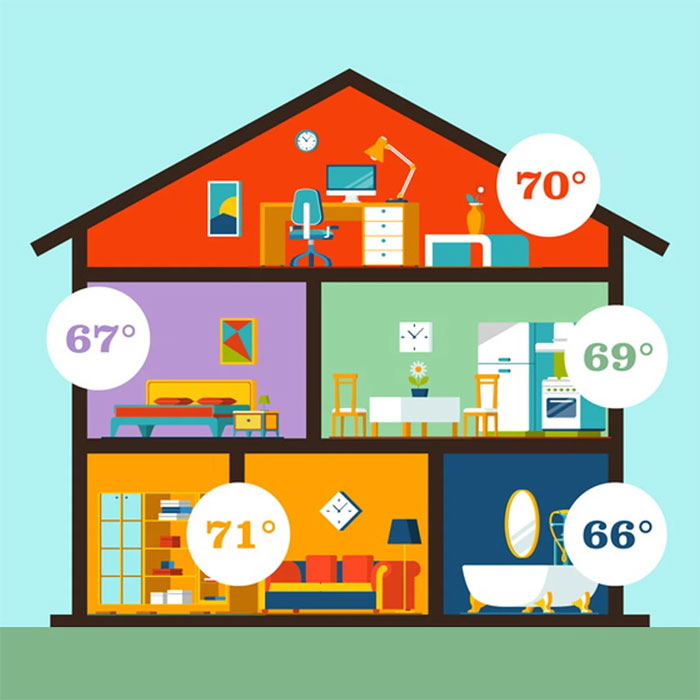
One of the most notable advancements in home heating systems is the rise of zoned heating. Zoning entails dividing buildings into independent zones with distinct temperature control. This unlocks an array of advantages compared to conventional, single-zone heating. In this blog, we'll take a comprehensive look at what zoning involves and the many benefits it can provide.
What is Zoned Heating?
Zoning is a strategy that divides a home into distinct heating zones, each equipped with its thermostat and control system. These zones can encompass individual rooms or larger areas of the house.
The central idea behind zoning lies in its ability to deliver heat precisely where and when it is needed. This is accomplished through a network of dampers, thermostats, and controllers that work in unison to regulate temperature independently in each zone. This approach represents a marked departure from traditional heating systems where a single thermostat governs the entire house, often leading to uneven temperatures and energy inefficiency.
Comfort Advantages of Zoned Heating
One of the biggest benefits of zoning is enhanced comfort through customization:
- Different Use Areas: Separate zones allow tailoring temperatures for different needs like bedrooms, living spaces, kitchens, etc.
- Vacant Room Control: Zoning prevents overheating empty rooms, allowing energy savings without sacrificing comfort.
- Multi-Story Control: Stairs and ceilings make it hard to control multi-level homes. Zoning allows customizing each floor.
- Additions and Renovations: New and existing areas often have distinct needs. Zoning provides independent control.
- Accessory Spaces: Zoning allows cooling rarely used spaces like garages and sunrooms while maintaining warmth where needed.
- Air Quality Control: Zoning limits air transfer between areas, helping contain odors, smoke, humidity and allergens.
Energy Efficiency Advantages of Zoned Heating
- Minimized Overheating: Zoning avoids wasted energy from heating vacant spaces. This also reduces humidity and utility costs.
- Right-Sized Systems: With enhanced temperature control, zoning allows proper sizing of HVAC equipment during installation for optimized operation.
- Limited Reheat: Zoning reduces reheating cooled air by delivering heat directly where and when needed.
- Increased Equipment Life: With reduced run times and proper sizing, zoned systems limit strain and wear on HVAC components.
- Energy Savings: Studies confirm zoning can reduce total heating energy usage by 20-30% compared to non-zoned systems.
Zoned Heating Provides Convenience and Control
- Custom Schedules: Programmable zoning allows setting different weekday, weekend and vacation schedules for each zone.
- Smart Technology: Advanced zoning systems enable remote monitoring and adjustments from phones, tablets and computers.
- Flexible Manual Control: Separate thermostats allow easy manual tweaks to temperatures whenever desired.
- Simplified Maintenance: With better monitoring and diagnostics, zoning allows easier troubleshooting and equipment maintenance.
- Peace of Mind: Zoning provides added reassurance, convenience and comfort from having customized control over your environment.
- Enhanced Resale Value: Zoning is an attractive feature for home buyers given the benefits around comfort, efficiency and control.
Zoned Heating Enables Adaptable Heating Designs
- Renovations: Zoning allows seamlessly integrating additions and renovations with existing HVAC systems.
- Multi-Family Homes: Multi-unit buildings can benefit greatly from independently zoned heating.
- Mixed-Use Buildings: Facilities with a mix of residential, commercial and industrial uses can tailor zoning extensively.
- Phased Construction: Zoning enables gradually building out HVAC systems as phases of large projects are completed.
With the ability to customize temperatures based on usage, zoning unlocks a wide range of advantages over conventional single-zone heating. From enhancing comfort and conserving energy to extending the lifespan of your HVAC system and reducing your carbon footprint, the benefits of zoning are compelling. Whether you choose to adopt this technology or not, it is evident that zoning holds a promising place in the future of residential heating. It offers homeowners the opportunity to enjoy superior comfort while making strides toward a more sustainable and cost-effective household.


